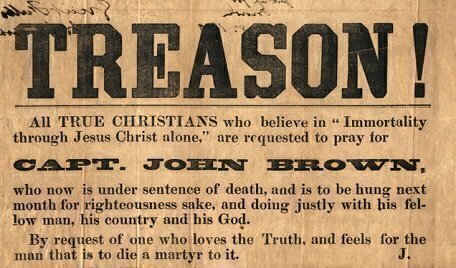Accusations of treason are a serious matter in the public arena, but history shows few examples of charges followed by convictions in legitimate treason cases.
 In a current political debate, opponents of Donald Trump Jr. have bandied about the word in relation to Trump Jr.’s email and conversations with a Russian attorney.
In a current political debate, opponents of Donald Trump Jr. have bandied about the word in relation to Trump Jr.’s email and conversations with a Russian attorney.
"This is moving into perjury, false statements and even potentially treason,” said a Trump political opponent, Senator Tim Kaine, on Tuesday. But even Trump critics Norman Eisen and Richard Painter, in a New York Times op-ed, said treason isn’t a factor in the current debate.
“Prosecution under the federal treason statute is ultimately unlikely because we are not at war with Russia. But during the Cold War, treasonous conduct was often prosecuted under other statutes,” they wrote on Tuesday.
Carlton Lawson, a University of California At Davis law professor, also said in the Chicago Tribune that the alleged actions weren’t close to the constitutional definition of treason.
“As a technical legal matter, no, and not even close. Article 3 of the United States Constitution limits the crime of treason to two specific offenses: levying war against the United States, and adhering to their enemies, giving them aid and comfort. It was deliberately crafted to exclude a wide variety of political offenses, such as criticizing the government,” Lawson said.
Article 3, Section 3 of the Constitution spells out what is considered treason in the United States: “Treason against the United States, shall consist only in levying War against them, or in adhering to their Enemies, giving them Aid and Comfort. No Person shall be convicted of Treason unless on the Testimony of two Witnesses to the same overt Act, or on Confession in open Court. The Congress shall have Power to declare the Punishment of Treason, but no Attainder of Treason shall work Corruption of Blood, or Forfeiture except during the Life of the Person attainted.”
Under this narrow definition there only have been about 30 treason trials in the United States since 1789.
The whole concept of treason is an important part of the Constitution. The Founding Fathers knew the British laws about treason all too well. The British laws were much broader than our current definitions, and treasonable offenses include having sexual relations with the king’s wife, counterfeiting, and the murder of a husband by a wife.
The clause, as it was developed by James Wilson at the 1787 convention is Philadelphia, borrowed part of its wording from the English Statute of Treason, and it limited the ability of Congress to define treason. It also put a high burden of proof in place by requiring “the testimony of two witnesses to the same overt act.”
The U.S. legal code spells out the punishments for treason, which includes death.
Ethel and Julius Rosenberg were the last people in the U.S. involved in a treason-related trial to be convicted, sentenced to death, and then executed. Technically, the Rosenbergs were charged with espionage conspiracy under Title 50, U.S. Code, Section 34, which is better known as the Espionage Act. Their deaths in 1953 were debated globally and seen as an important development in the Cold War and the expansion of the era of McCarthyism.
Among the treason trials in the past two centuries were the acquittal of Aaron Burr, the former vice president, and the convictions of abolitionist John Brown, and the four Abraham Lincoln assassination conspirators. Recently, the government reportedly pondered treason charges against former contractor Edward Snowden.
One of the most recent American citizens charged with treason was Adam Yahiye Gadahn, the California-born spokesman for al-Qaida. In 2006, Gadahn was indicted in the Central District of California for treason and giving material support to al-Qaida. Gadahn was reportedly killed in a 2015 drone attack in Pakistan.
Anwar Al-Awlaki, the U.S.-born al-Qaida member, was never formally charged with treason. Instead, he was killed in a drone attack in 2011 in Yemen.
John Walker Lindh, an American citizen who was captured fighting for the Taliban, wasn’t charged with treason when he accepted a plea bargain in court. He was indicted on 10 other charges by a federal grand jury.
Scott Bomboy is the editor in chief of the National Constitution Center.







